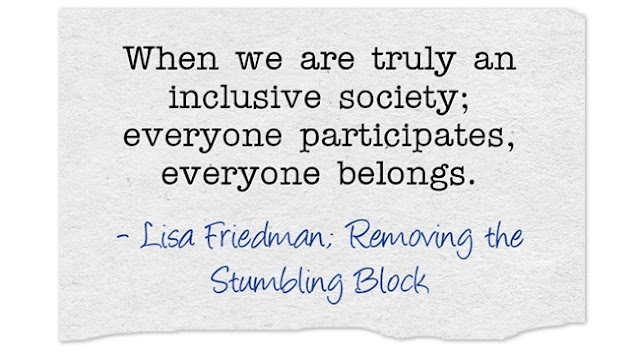In Jewish education and synagogue life we have understood for a long time that it is impossible to please everyone. It doesn't mean that we don't have a vision and work toward it; rather we do exactly that by living and acting according to our values. But it does mean that sometimes we have to recognize that there are those we will not please.
So, too, is it with an initiatives like this one. Sesame Street has a vision to help the world celebrate the uniqueness in each and every child, and they have launched a project built on years of research whose goal is to highlight the commonalities among children, not their differences. They want to build empathy, compassion and work to reduce the epidemic of bullying our children face. They did their homework, focused on their target audience, and made thoughtful choices.
Are there critics? Of course there are. Just read the comment threads from any of the various articles and blog posts that have been posted. For as many people who applaud the effort there are equally as many who bash it.
I'm on the applaud-side of the fence, if you were wondering. But I don't think this is the first permanent Sesame Street character with a disability. In fact, I think there have been characters with disabilities woven into children's television for a very long time.
I suppose you could say inclusion is the lens through which I view the world. That may be true. But I think we all have that lens, we just might not always call it that. And so, if we are talking about identifying a character from children's television as having a specific disability, I have already been doing this for a long time. For as long as I can remember, I have been identifying the character in each show my children watch as the one with a disability:
We have long recognized Cookie Monster as a character who displays impulsive behavior.
We have chatted about Oscar's anger management struggles.
We have acknowledged that Ferb, of Phineas and Ferb fame, could possibly be selectively mute.
We have discussed Patrick Star's (SpongeBob's best friend) learning issues.
And there's Fozzie Bear, who interprets figurative language as literal, is not good at taking social cues, doesn’t read a room well, and tends to repeat himself long after the need has passed. Autism?
I believe there is such a character in every children's show. I have used this notion to help me teach my children to be accepting of disabilities. Is such a character named and classified? Definitely not. But do they exist? For sure. And I think this is far more inclusive, by the way.
It is, as this author deftly calls it, the Fozzie Conundrum. By far the most astute of all the articles I have read about the new Sesame Street initiative, she hits the nail on the head when she says, "We’ve known Fozzie for years and never needed anyone to explain away his eccentricities. In fact, we’ve loved his quirks and have never seen him as anything but Fozzie."
The Fozzie Conundrum. "Would knowing Fozzie had autism have changed the way we looked at him? Maybe." And that would be a shame. Because when we think about Fozzie we think about a character who is lovable, funny and a little bit quirky.
The Fozzie Conundrum. "Would knowing
Fozzie had autism have made it easier for his parents and friends to
understand his behaviors as he grew into himself? Also maybe." It's a challenge.
There's always a balance to be struck. Do we need better representation of disabilities on television and in mainstream media? Yes! But do we need to call attention to every difference among us and label it? Certainly not. We need to figure out how to land somewhere in the middle.
We need to be aware that each one of us is different with gifts to offer the world and challenges to navigate. And this is exactly where Sesame Street gets it right. We need to celebrate the uniqueness that each and every child brings to the world.
Be sure you don't miss a post from Removing the Stumbling
Block:




